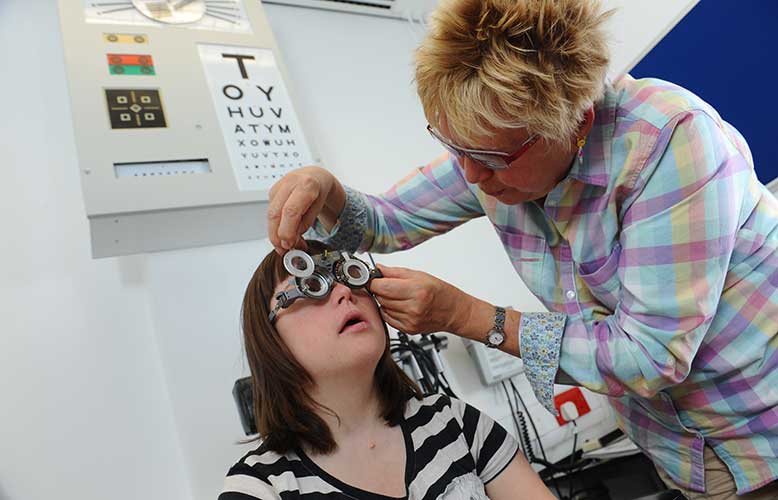- OT
- Life in practice
- Practitioner stories
- Cardiff University research unit receieves accolade
Cardiff University research unit receives accolade
Work to improve the eye care of children with Down’s syndrome has been recognised with the Queen’s Anniversary Prize

04 December 2017
Cardiff University’s Down’s Syndrome Vision Research Unit has become the first optometry unit to receive the Queen’s Anniversary Prize.
The unit’s efforts to improve the eye care of children with Down’s syndrome was recognised with the accolade, which is awarded every two years to UK universities and colleges for work of outstanding “excellence, innovation and tangible beneficial effects in the wider world.”
Dr Maggie Woodhouse (pictured with a patient), who is head of the unit, told OT that the recognition raises awareness of the visual problems that can hold back the achievements of children and young people with Down’s syndrome if left undiagnosed.
She added that the solutions to these issues are often simple and straightforward.
“This award is really important to me because it represents recognition of the work of the amazing people I have been lucky enough to work with over the years,” Dr Woodhouse emphasised.

“My passion for this area of research arises entirely from meeting children and young people with Down’s syndrome and their families, and realising what amazing potential these young people can have and the enormous value they add to our society,” she elaborated.
Research conducted by the unit has underpinned national and international guidance on the vision care of people with Down’s syndrome, as well as informing training provided to optometrists.
The unit has established the world’s only longitudinal cohort of young people with Down’s syndrome. More than 250 children and young adults from across the UK are involved in studies conducted by the unit.
Down’s Syndrome Association chief executive, Carol Boys, said she is delighted that the unit has been recognised for its pioneering work.
“Maggie and her colleagues have made an enormous difference to the lives of countless people with Down’s syndrome, both personally, through their research and through their teaching programme as well,” she highlighted.
Image credit: Cardiff University
Advertisement


Comments (0)
You must be logged in to join the discussion. Log in